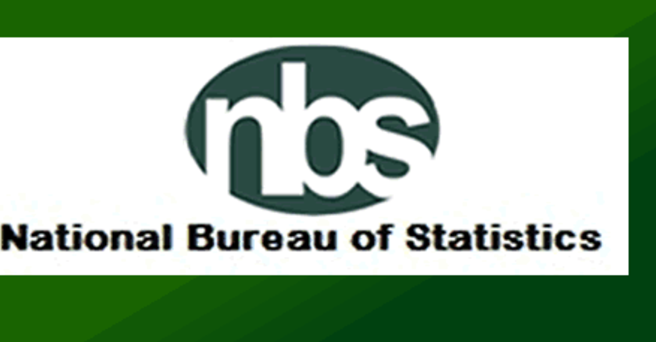NBS: GDP Grew By 4.03% In Third Quarter

The National Bureau of Statistics (NBS) yesterday revealed that Nigeria’s Gross Domestic Product (GDP) grew by 4.03 per cent in the third quarter (Q3) of 2021, compared with the 5. 01 per cent recorded in the preceding quarter of same year.
The Statistician General of the Federation (SGF)/Chief Executive, NBS, Dr. Simon Harry, who revealed this at a media briefing, said the negative impact of the COVID-19 continued to impact on economic performance.
He said despite the slower growth, the Q3 performance was considered a tremendous improvement over both Q1 and Q2 of the year, adding that there had been steady growth of the economy.
In nominal terms, aggregate GDP increased to N45.11 trillion in the period under review, compared with the N39.12 trillion recorded in Q2 and N39.09 trillion in Q3 2020.
In the same vein, real GDP which shows volume of economic activities, stood at N18.54 trillion, higher by N1.85 trillion compared to N16.69 trillion in Q2 as well as higher by N718.57 billion when compared to N17.82 trillion recorded in the corresponding quarter of last year.
The economy was largely driven by the non-oil sector which accounted for 92.51per cent of GDP, while the oil sector contributed 7.49 per cent to growth in Q3.
Daily oil production averaged 1.57 million barrels per day (mbpd) compared to 1.61mbpd in Q2 and 1.67mbpd in Q3 2020.
Oil growth rate stood at -10.73 per cent in real terms in the review period.
The SGF explained that the negative GDP figures recorded in 2020 as a result of the COVID-19 pandemic had serious base effects on output figures for Q2 and Q3.
Harry said:
I must state that the improvement being seen in the output growth over the last four quarters depicts a steady progress made in stemming the COVID-19 pandemic and the associated negative impact on livelihood, well-being, and the economy.
Globally, many countries have witnessed an improvement in economic performances compared to 2020 when COVID-19 was endemic.
He said economic recovery remained a gradual process that requires consistent collective efforts to improve economic activities across the institutional sectors.
He explained:
However, in Nigeria the prospect of full recovery is glaring provided the current trend of improved economic performance is sustained in the rest of the year and beyond.
Agriculture contributed 29.94 per cent to real GDP, higher than the 23.78 per cent recorded in Q2 while manufacturing accounted 8.96 per cent higher than the 8.69 per cent recorded in the preceding quarter.
Also, trade contributed 14.93 per cent to GDP, lower than the 16.66 per cent recorded in Q2.
You might be looking at the 5.01 per cent as being higher than the 4.03 per cent but when you look at the base effects, you discover that the margin between the two, certainly that of the third quarter was a higher figure compared to the 5.01 per cent as released in the second quarter of the year,
the SGF added.
He insisted the economy was growing rather than declining.
There was serious base effects affecting the figure because Q3 2020 recorded negative rate while Q2 2020 recorded negative rate. And so if you consider the margin between the two figures, you will discover that the economy certainly is growing rather than decreasing. It is the base figures that have influenced the figure for this year,
he added.
However, reacting to the GDP numbers, analysts have urged the Federal Government to deepen its poverty alleviation programmes so that vulnerable Nigerians would feel its impact.
They also advised the government to initiate policies that could enhance real growth and, “not paper growth” as well as curb the rising insecurity across the country.
The analysts who spoke in separate interviews with Flavision, further advised the government to sustain current efforts at stimulating growth.
Managing Director/Chief Executive, Dignity Finance and Investment Limited, Dr. Chijioke Ekechukwu, said the economic performance showed that the country was still growing, adding that the government should continue to maintain the growth trajectory.
Recall that year on year measurement was involved in determining the GDP growth.
About this time 2020, the COVID-9 restrictions eased off and businesses peaked again.
So whereas Q3 performance of 2021 grew year to date in real terms, the year on year comparison with Q2 of 2021 is expected to decline because of the base year effect,
he said.
Also, the Managing Director/Chief Executive, SD&D Capital Management Limited, Mr. Idakolo Gbolade, said the performance was as a result of the policies of the federal government currently being implemented by the Central Bank of Nigeria (CBN).
He said the Federal Government needed to look inwards to create a conducive environment for the economy to thrive by curbing the rising cases of insecurity and ensure that the CBN maintains its interventions in foreign exchange to reduce cost of production.
He urged the government to deepen its poverty alleviation programmes, so that it would reach the original beneficiaries in order to make real impact.
Gbolade said:
The maintenance of the MPR at 11.5 basis point caused the economy to witness a higher economic performance.
However, the headwinds of continuous hike in cost of commodities coupled with the rising cost of cooking gas and impending hike in petrol prices are a major concerns.

Justin Nwosu is the founder and publisher of Flavision. His core interest is in writing unbiased news about Nigeria in particular and Africa in general. He’s a strong adherent of investigative journalism, with a bent on exposing corruption, abuse of power and societal ills.













